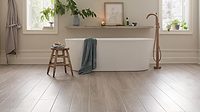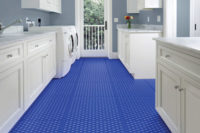Tarkett continues its initiative to provide healthy flooring products that impact indoor air quality (IAQ) through sustainable development and re-use, the company said.
Since 2012, the company—credited by Healthy Building Network for having the most restrictive policy on post-consumer PVC use in the industry for hard surface flooring—no longer purchases ortho-phthalates and has moved all North American virgin-material products to a phthalate-free formulation.
Phthalates are primarily used as plasticizers (substances added to plastics to increase their flexibility, transparency, durability and longevity) in a variety of products, including vinyl flooring. Tarkett began using phthalate-free technology in its North American plants in 2010.
“At Tarkett, we constantly evaluate our products from performance to chemical make-up to exceed customer expectations and stay ahead of industry demands,” said Diane Martel, vice president of environmental planning and strategy for Tarkett. “We are proud to be at the forefront of the trend for phthalate alternatives in building product manufacturing, and look forward to providing additional solutions for people-friendly indoor spaces.”
In related efforts, Tarkett’s heterogenous and homogeneous flooring and linoleum as well as vinyl and rubber wall base products from Johnsonite now have a TVOC (Total Volatile Organic Compound) emission of 100 micrograms per cubic meter or less, with the goal of being under 100 micrograms for all products by 2020. The low emissions strategy marks Tarkett’s latest move to provide better indoor environments. This response is critical to consumers’ quality of life, especially considering the recent population shift to urban areas, where more time is spent indoors, said the company.
Tarkett’s initiatives also align with its closed-loop, circular design approach to environmental responsibility and eco-innovation. The company views the human experience as one of the most critical barometers of success of an indoor environment, which includes products that contribute to improved indoor air quality (IAQ), according to the company.
For more information, visit tarkett.com.





